Samuel Alito Brings the Culture War to His Own Front Yard
The Supreme Court justice had an upside-down flag flying at his home, in an apparent reference to the “Stop the Steal” campaign.
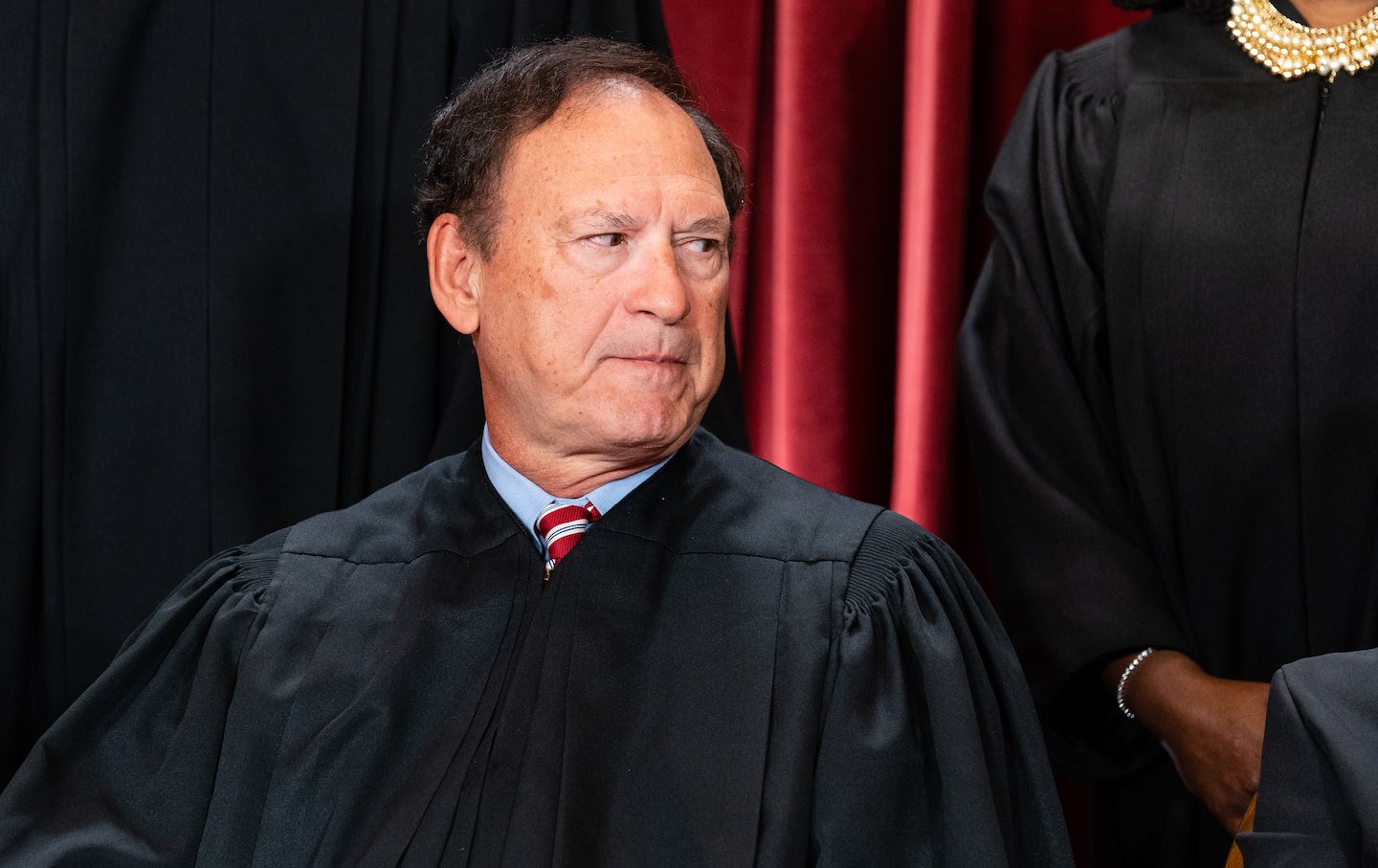
Associate Justice Samuel Alito Jr. when the formal group photograph of the Supreme Court was taken in Washington, D.C., on Friday, October 7, 2022.
(Eric Lee / Bloomberg)Even by the current debauched standards of right-wing federal jurisprudence, it came as a shock to learn that just days after the attempted coup of January 6, an upside-down flag flew outside the home of Supreme Court Justice Samuel Alito in Alexandria, Virginia. Then a widespread symbol of solidarity with the “Stop the Steal” lies of the MAGA right, the flag was captured in photos recently obtained by The New York Times.
Under both long-standing tradition and the provisions of the high court’s ethics code for its own employees, representatives of the court are supposed to refrain from expressing partisan political attachments. And of course, brandishing the symbol of an illegal uprising founded in baseless claims about an illegitimate election is a good deal more confrontational than a bumper sticker or yard sign advertising support for a candidate or a ballot initiative—it’s something closer to a formal declaration of secession. It’s also, at minimum, cause for Alito to recuse himself from the two January 6 cases now up before the court—including the Trump petition for total legal immunity for sitting presidents. Other ethics charges against Alito would be warranted—if, that is, the high court’s ethics protocols weren’t so porous and self-serving.
Alito, who together with Clarence Thomas forms the hard-right vanguard on the high court, followed Thomas’s example when confronted with the prospect that his belief system could play havoc with his standing on the court: He blamed his wife. In an e-mail statement to Kantor, Alito claimed that the charged symbolic gesture was rooted in his wife’s displeasure with a neighbor’s vulgar anti-Trump yard sign. “I had no involvement whatsoever in the flying of the flag,” Alito said. “It was briefly placed by Mrs. Alito in response to a neighbor’s use of objectionable and personally insulting language on yard signs.”
To revert to some objectionable language of my own: what bullshit. It is, first of all, beyond parody for the justice who authored the egregious majority opinion hijacking the bodily autonomy of American women in Dobbs v. Jackson Women’s Health Organization to profess that his life partner has uncontested domestic sovereignty in the adoption of exterior political messaging. Also bullshit is his claim that his wife “briefly placed” the upside-down flag outside their home; the Alexandria neighbors interviewed by the Times said that it was there for several days. Even after just one day in position, the argument that it was an entirely unilateral work of Martha-Ann’s falls apart on its face; any adult sharing close living quarters with a militant flag-brandishing partner would then put some variation of the question Just what the hell are you up to, sweetheart? to said partner, and the ensuing exchange would result in either spirited dissent and flag removal or (the clear outcome here) harmonious consent and mutual self-satisfaction.
Meanwhile, there are some indications that the Alitos’ fealty to the cause of government overthrow may have gone beyond front-porch symbolism. At least according to the account of indicted Trump attorney and coup-plotter Sydney Powell, the ultimate aim of the “Stop the Steal legal offensive” was, after fomenting sufficient chaos and disruption ahead of Congress’s scheduled certification of the 2020 election outcome, to deliver the whole raging mess over for Alito’s sympathetic review in order to straighten it out in Trump’s favor. From this vantage, the message of the hoisted flag may have been intended as much to signal Alito’s continued adherence to the coup plot as to get a rise out of his vulgar liberal neighbors.
Finally, there’s the question of commensurate response in the politics of yard-centric retaliatory messaging. The sign that provoked the Alitos brandished the forceful if unimaginative slogan “Fuck Trump”—but there’s no discursive equivalence between that show of personal political distaste and a call to arms seeking to menace Congress into overthrowing a free and fair election and instituting a right-wing dictator. (What’s more, in defending the flag’s placement, Alito piled lie upon lie: In a follow-up interview with Fox News, he professed outrage that the neighbor’s coarse anti-Trump message was posted within 50 feet of the school bus stop for neighborhood kids—the only problem being that the Alexandria public schools weren’t holding in-person classes due to the Covid lockdown.)
No, the central ingredient in the great Alexandria flag flap is clearly the same thing that has driven Alito’s legal reasoning throughout his career: a posture of unappeasable, ever-renewable cultural grievance. It’s right there in his writings—not merely in the notorious Dobbs ruling, whose crackpot originalism threatens any claim to rights not enumerated in the Constitution’s holy writ, but in self-dramatizing asides in other opinions. His dissenting opinion in the court’s 2015 Obergfell v. Hodges decision legalizing gay marriage, for example, disputed that religious opposition to the practice still enjoyed First Amendment protections: “I assume that those who cling to old beliefs will be able to whisper their thoughts in the recesses of their homes,” he observed archly. “But if they repeat those views in public, they will risk being labeled as bigots and treated as such by governments, employers, and schools.”
Since Antonin Scalia’s death in 2012, Alito has become the public face of the court’s hard-right ethos, taking up the cause of cultural resentment with singular brio. In a revealing 2022 New Yorker assessment of Alito’s career on the bench, Margaret Talbot depicts a longtime legal backbencher in the conservative movement now gleefully exacting revenge on his enemies in the culture wars. In a 2008 speech at a fundraising event for The American Spectator, Alito declared, after invoking the apparently united cultural front of Barack Obama, Eugene McCarthy, and Country Joe and the Fish, that “for the past forty years there have been places in this country, sort of like the island in ‘Jurassic Park,’ where it’s always been 1967.”
One of those places is clearly the moral imagination of Alito, who attended Princeton University as an undergraduate at the height of the nation’s protests against the Vietnam War. An abiding animus against the counterculture’s excesses is a clear through line in his career. In his 1985 application to the Reagan administration’s Office of Legal Counsel, Alito touted his membership in the Concerned Alumni of Princeton—a group determined to roll back the Ivy League’s incremental efforts to reverse past patterns of discrimination in advancing coed enrollment, increasing minority placement, and recruiting—gasp!—graduates of public secondary schools. The group’s description of its own mission is a masterwork of clubby euphemism, pledging to preserve Princeton as “a body of men, relatively homogenous in interests and backgrounds.” In the same application, Alito explained how he “first became interested in government and politics during the 1960s” and specified that “the greatest influences on my views were the writings of William F. Buckley, Jr., the National Review, and Barry Goldwater’s 1964 campaign.” He landed the job.
Atop the high court, Alito continues to whale away at the same pasteboard targets in a mood that can only be described as gloating. After the Dobbs ruling came down, he delivered a culture-war broadside before the University of Notre Dame Law School’s Religious Liberty Initiative at the Palazza Colonna in Rome. The gathering itself was steeped in first-order ethics compromises, since several of the law school colleagues of Alito’s audience had themselves filed briefs for the Dobbs plaintiffs. But Alito was feeling too chuffed to be detained by conflict-of-interest considerations. Referencing the Dobbs opinion, he announced, “I had the honor this term of writing, I think, the only Supreme Court decision in the history of that institution that has been lambasted by a whole string of foreign leaders. One of these was former Prime Minister Boris Johnson—but he paid the price,” referring to Johnson’s recent resignation of his post.
At a 50th anniversary gala for Thomas Aquinas College in Southern California, Alito boasted, “What the founders of the College were professing constituted the real counterculture.” All of these outbursts can be read as score-settling variations of his infamous performance at Barack Obama’s 2010 State of the Union address: when Obama called out the court’s reckless Citizens United ruling undoing federal campaign finance reform, Alito mouthed the words “not true” in reply—again defying the norms that had long bound justices to affect a mien of public impartiality at the event.
Against this backdrop, it’s beyond laughable to picture Samuel Alito wanly commuting across the Potomac to his day job while meekly ignoring a neo-Confederate flag display engineered by his wife outside their home. The picture calls to mind a despairing political refrain by a great counterculture bard of a later vintage than Country Joe and the Fish: “My brain is hanging upside down.”
Disobey authoritarians, support The Nation
Over the past year you’ve read Nation writers like Elie Mystal, Kaveh Akbar, John Nichols, Joan Walsh, Bryce Covert, Dave Zirin, Jeet Heer, Michael T. Klare, Katha Pollitt, Amy Littlefield, Gregg Gonsalves, and Sasha Abramsky take on the Trump family’s corruption, set the record straight about Robert F. Kennedy Jr.’s catastrophic Make America Healthy Again movement, survey the fallout and human cost of the DOGE wrecking ball, anticipate the Supreme Court’s dangerous antidemocratic rulings, and amplify successful tactics of resistance on the streets and in Congress.
We publish these stories because when members of our communities are being abducted, household debt is climbing, and AI data centers are causing water and electricity shortages, we have a duty as journalists to do all we can to inform the public.
In 2026, our aim is to do more than ever before—but we need your support to make that happen.
Through December 31, a generous donor will match all donations up to $75,000. That means that your contribution will be doubled, dollar for dollar. If we hit the full match, we’ll be starting 2026 with $150,000 to invest in the stories that impact real people’s lives—the kinds of stories that billionaire-owned, corporate-backed outlets aren’t covering.
With your support, our team will publish major stories that the president and his allies won’t want you to read. We’ll cover the emerging military-tech industrial complex and matters of war, peace, and surveillance, as well as the affordability crisis, hunger, housing, healthcare, the environment, attacks on reproductive rights, and much more. At the same time, we’ll imagine alternatives to Trumpian rule and uplift efforts to create a better world, here and now.
While your gift has twice the impact, I’m asking you to support The Nation with a donation today. You’ll empower the journalists, editors, and fact-checkers best equipped to hold this authoritarian administration to account.
I hope you won’t miss this moment—donate to The Nation today.
Onward,
Katrina vanden Heuvel
Editor and publisher, The Nation
More from The Nation
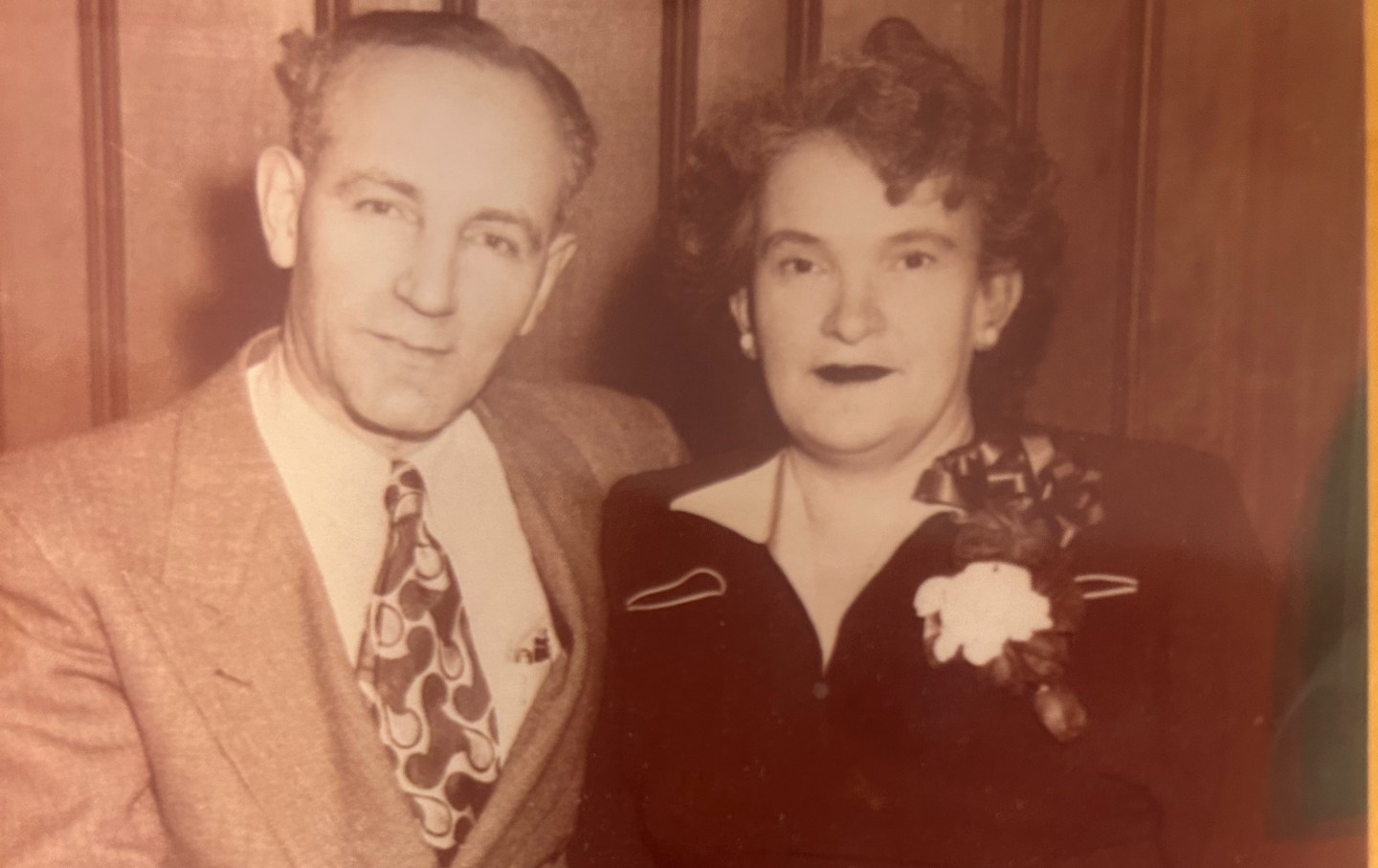
The Supreme Court v. My Mother The Supreme Court v. My Mother
After my mother escaped the Holocaust, she broke the law to save her family. Her immigration story is more pertinent today than ever before.
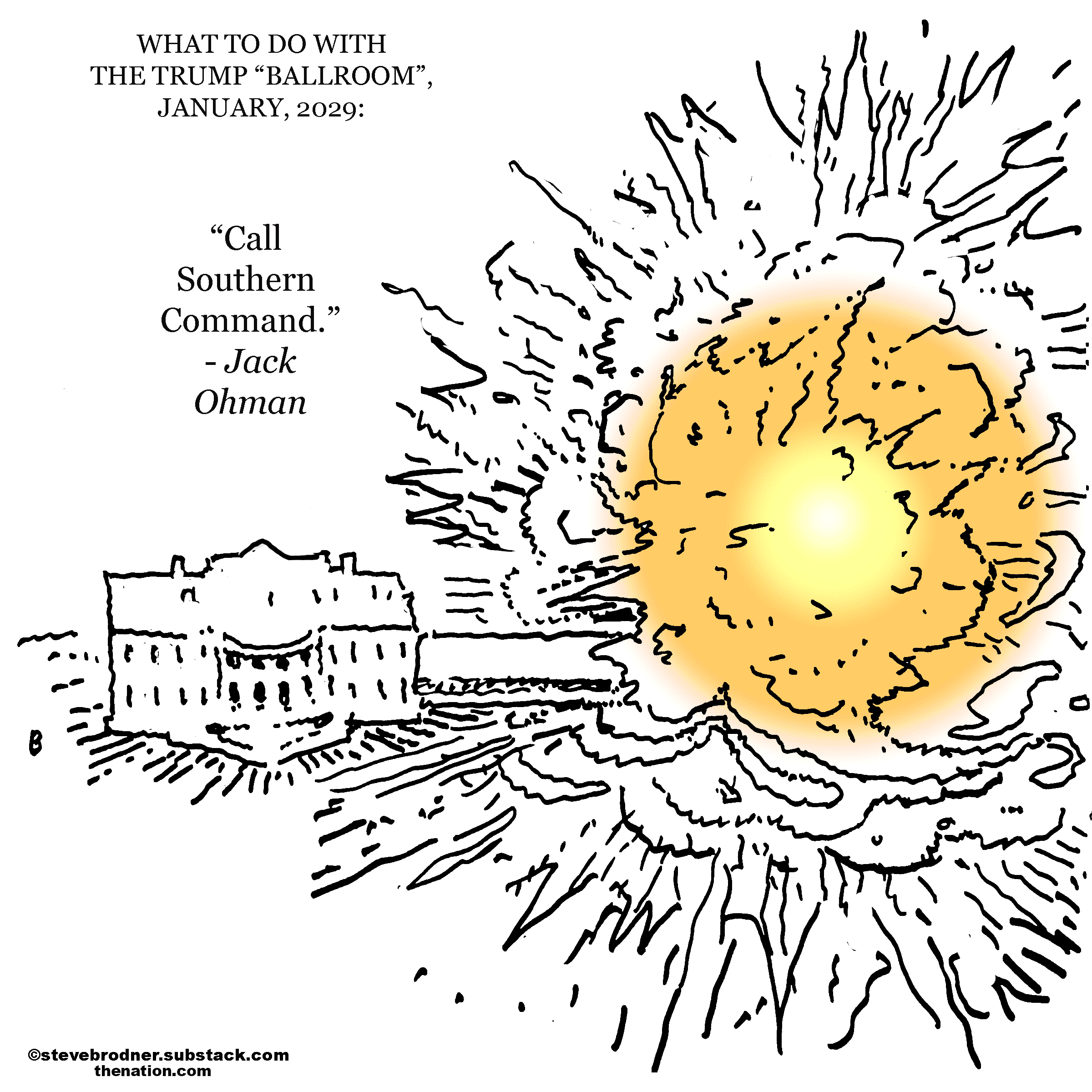
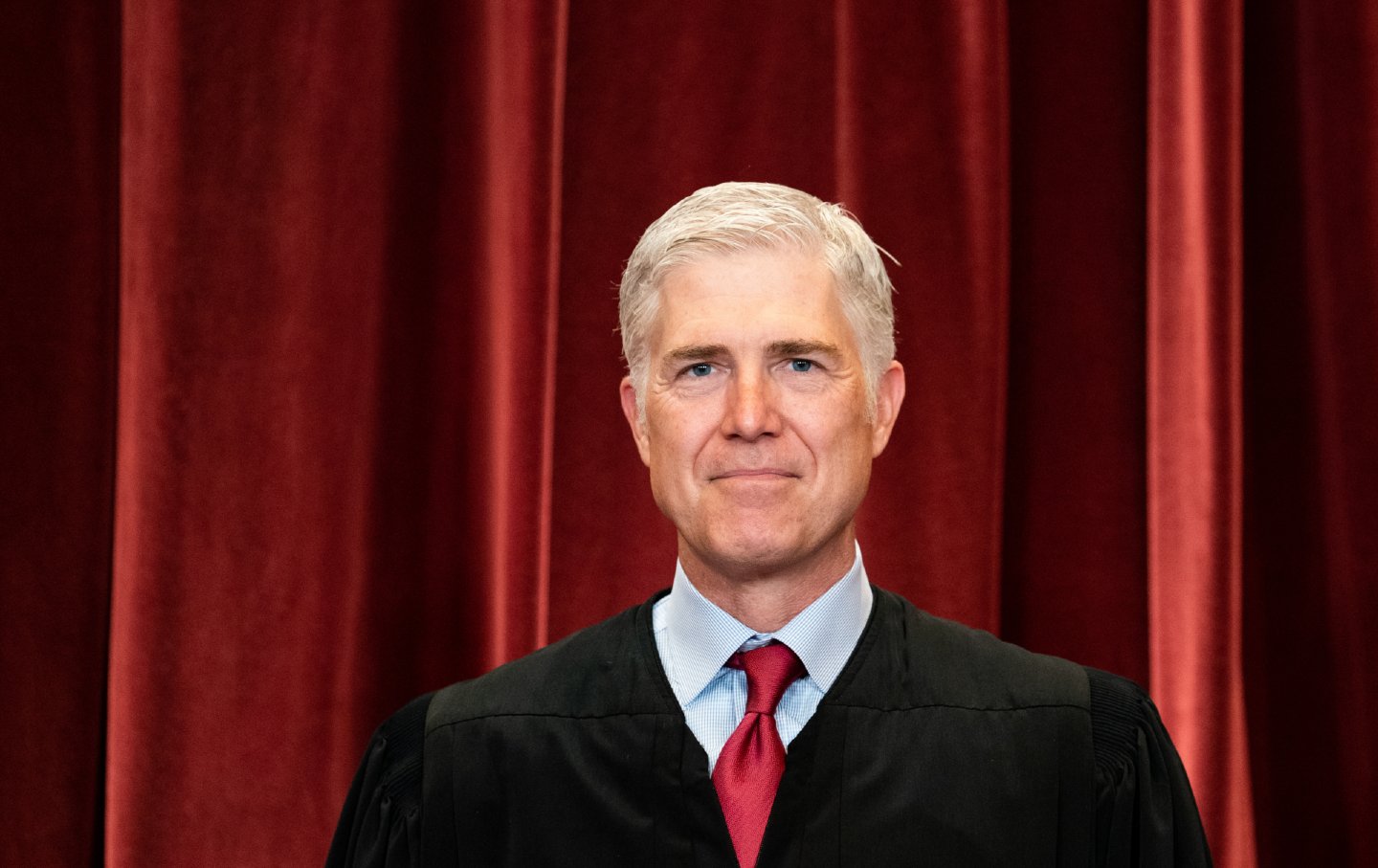
The Supreme Court Has a Serial Killer Problem The Supreme Court Has a Serial Killer Problem
In this week's Elie v. U.S., The Nation’s justice correspondent recaps a major death penalty case that came before the high court as well as the shenanigans of a man who’s angling...

Corporate Democrats Are Foolishly Surrendering the AI Fight Corporate Democrats Are Foolishly Surrendering the AI Fight
Voters want the party to get tough on the industry. But Democratic leaders are following the money instead.
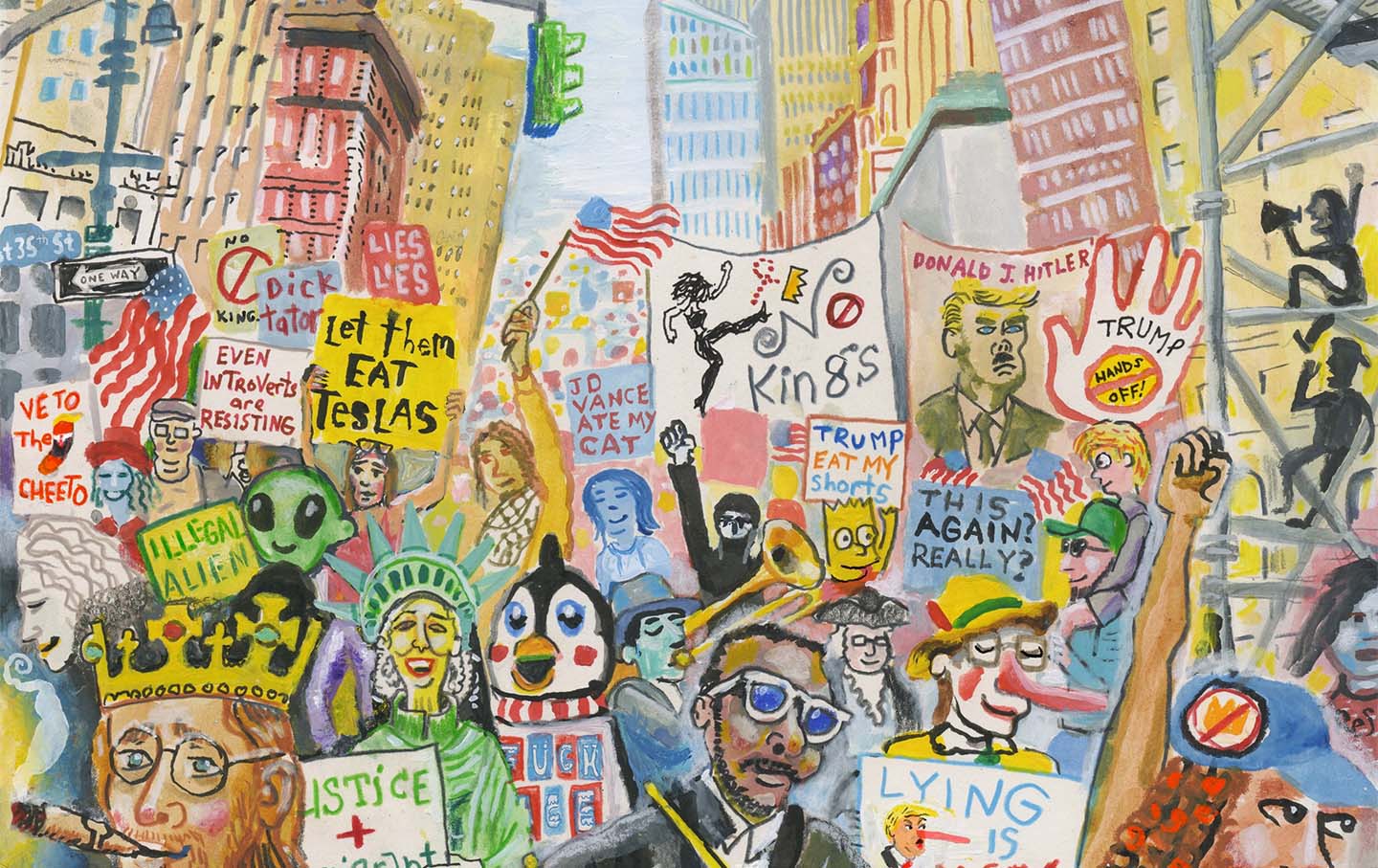
Marching Against a Corrupt Regime Marching Against a Corrupt Regime
People taking to the streets for democracy.

Keeping the Police Out of Pregnancy Care Keeping the Police Out of Pregnancy Care
We must be vigilant in keeping law enforcement out of exam rooms.


